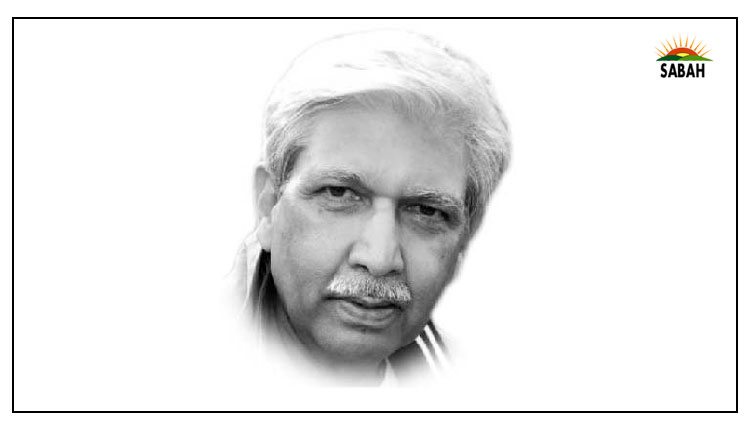Teleological rationalisations ۔۔۔۔ Farrukh Khan Pitafi
Karl Popper’s readers know how critical he was of the idea of historicism. This scribe belongs to the same community. Any attempt to ascribe meaning to the creative chaos of history is like children imagining that random clouds in the sky represent more profound wisdom than a roll-of-the-dice happenstance. A complicated roll of the dice, I grant you. After all, many factors coalesce into the spectacular cloud show we see daily in the sky. But is there a greater meaning hidden in these abstractions? Are we just being fooled by randomness? Certainly not. It is what it is. Remember that clouds are a product of known scientific laws that work like clockwork. The subject matter of social sciences, man and society are far less predictable. To think that history has a greater design and that it unfolds according to a pattern is to indulge in a fool’s errand.
But that is not to say that things do not have an inherent meaning or that all our actions do not have a purpose. We create purpose when we add value to things. A chair, in essence, is a bunch of dead wood cut into pieces of various sizes and rearranged into a structure. It is when you use it for sitting that its purpose manifests itself. Should a chair just be a chair, or should we seek a deeper philosophical meaning for it, too? You can try, but what is the point? This is something you just created or bought. Let it serve its actual purpose and sit on it.
And yet, some people can’t seem to function without alluding to a grand design of things. I must confess that when devoid of its philosophical moorings, my mind also drifts and sees patterns where none might exist. But here is the thing. Even at the worst of times, my mind does not depend on these patterns.
Others turn the world upside down to divine the future. Just look at the simple things first. I marvel at the belief of individuals who think that stars that are lightyears apart can predict the future by appearing in our skies in groups of various shapes and sizes. How delightfully delusional and anthropocentric of us. Likewise, others think the lines in your hands know what will happen in your life. These lines have a function, but that’s not it. If these lines or creases had not been there, folding your hand would have been an uncomfortable experience. Isn’t it enough? The beauty of the structure, functioning and mechanism that operates a hand should be sufficient. But we have to pretend that not only were we manufactured, but someone thought it wise to print a difficult-to-read user manual on the most used parts of our body.
Remember, I mentioned folks who cannot function without believing in historical patterns or high purposes. Some clearly cannot distinguish between facts and fiction? like Don Quixote. Whenever Hollywood produces some mind-bending movies, they think that these admirable works of fiction, from the Matrix trilogy to Stargate, subliminally reveal deeper secrets to them. I have seen serious scholarly work in service of this wild goose chase. A recent series called Devs seems to complicate the matter further. In it, a high-powered AI is used to predict events from the distant past and in the future and create a visual simulation of them. The machine produces images from the crucifixion of Jesus and similar historical events, and the team leading the project concludes that it is a fatalistic universe. You might have come across a clip circulating on social media which, as if taking a cue from this series, claims AI was asked how pyramids were built, and it generated a simulation video of ancient alien giants from Babylonian myths. It is plain that someone read theories about ancient aliens, asked an AI to create a video simulation of that and passed it on as the opinion of an all-knowing AI.
Recently, in a show, a guest from Iran used Antonio Guterres’ concept of “ontological security” to rationalise the confrontation between Israel and Iran. In response, I humbly submitted that I was more concerned about teleological harmony. Teleology is the explanation which seeks to understand events not by their causes but by their purpose. This, of course, can be taken in many different directions but this scribe only meant to use it in its basic utilitarian form. When you zoom out from the immediate, disengage from tribalism and take a dispassionate look at the huge loss of human life and suffering caused by recent conflicts, the question that comes to your mind is about its purpose. It is mind-numbing to think that this much blood is spilt either for notional constructs or land. Notional aspirations are just that. And land is expendable. Human lives are not. More land can be created by installing high-rise buildings colonising oceans and space thanks to new technology. But even our most advanced technology has been unable to recreate human life from scratch. Which one is more precious? Pray, you tell.
And look at the justifications used. Have you ever encountered the term “collateral damage” casually thrown around by security pundits? Merriam-Webster defines it as an “injury inflicted on something other than an intended target”. It doesn’t explain when human lives became expendable things.
You listen to racial, cultural or political supremacists, and you are stunned. Some people still think certain human groups are inferior to others by birth or just by believing in something. You can forgive religious fanatics for thinking that as their claims come from sources other than science. The real damage is done by the lot that abuses science (mostly pseudo-science) to justify prejudice and mass murder. You will be surprised how much of this exercise to put misinformation in service of political ambition has resulted in racist literature which misleads people even today.
This is why it is impossible to forgive the likes of Netanyahu for their betrayal. They are not ignorant fanatics. They know what they are doing is reprehensible and wrong. Someone with Netanyahu’s education also knows the consequences of his actions for his country, the causes he serves and the human civilisation. But he does not relent because he knows if he stops and is out of power, he will probably end up in jail. The bloodshed on both sides is more acceptable to him than that outcome. What a terrible waste of human resources used to randomly cut down our own.
Courtesy Express Tribune












